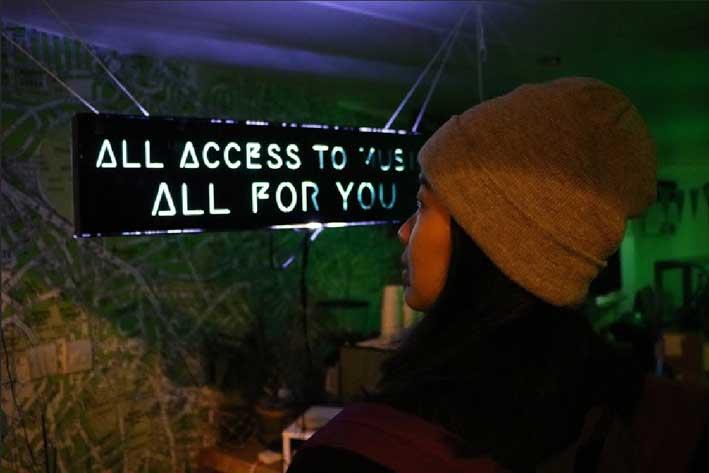After eight years of experience, working as an architect, Annemarie decided to pursue her growing interest in museum and exhibition design, as well as the design of visitor experiences. She recently took a course called MA Narrative Environments based at Central Saint Martins, London and graduated this year.
"I was intrigued by the course which promised to turn my understanding of architecture on its head, by focusing on the visitor's perspective," she explains, "As in film study, we crafted our experiences using storyboarding and the consideration of emotional journeys. The course relies on our ability to work in interdisciplinary teams - it takes graphic designers, illustrators, musicians, architects, performers, product designers, and writers to create a space which can tell a story."
Annemarie's final major project, entitled 'Hi-Fi Sci-Fi' is a series of immersive experiences on the future of music in the digital age. Using the science fiction genre, its first episode presented a music company which recommended tailored, yet questionable, brand interactions to its users. The music for the experience was original and written by the Maltese band Berne.
Musicians were asked to quantify their music (using emojis) and submit to the platform.
"What if one company, such as Spotify, completely dominated the music industry? What if it were the only way we would distribute, share and discover music? What if the company exploited its users, as is often the case today in our data driven society?" asks Annemarie.

The story was spawned from a number of original sci-fi stories, as well as insights obtained from a social fantasy workshop, run in conjunction with a local music school for youths called Big Creative Education. The project found that there are opportunities for music futurism which targets musicians. However, it can also act as a sharp wakeup call to music listeners, the target group that technology companies usually pander to.
Off the back of that, Annemarie got in touch with a local arts group called Blighty which runs events through a sister company called Immersive Music which 'brings iconic albums to life' (as Secret Cinema does for films). They commissioned Annemarie to craft a standalone interactive piece, as part of their event based on the life and music of Kate Bush.
"The space was an innovative take on a regular karaoke booth for the song "Wuthering Heights'", she says, "To suit Kate's lyrics, visitors became the ghost of Cathy, looking in at Heathcliff's window. It featured a ghostly ambience, spooky hologram lyrics (a mini Pepper's Ghost stage effect) and the scents of wood and pine."
An exciting yet challenging project - the booth was conceived, built and installed in three days and was met with rave reviews. It was such as success that Immersive Music have decided to make Annemarie and her partner Serge joint creative directors for their next events. In fact, over the summer, they were commissioned to draw up the feasibility plan and outline concepts for an immersive event based of The Beatles' Sgt. Pepper Lonely Hearts Club Band.
"In terms of growing as a person, I have definitely found new confidence in my capacity to assemble and manage teams, as well as my abilities as a researcher and designer. However, working freelance has proved to be quite stressful," she admits, "Although, my position at the helm of projects gave me creative control, it is at times challenging (and sometimes lonely) at the top. It has been great working with my partner Serge - however, working with your partner means that conversations can happen at any time of the day... and night!"
Although it has been hard work, Annemarie says that another 'mini success' was her ability to support herself financially while studying. Apart from continuing to work while she studied, she says that she is indebted to her two scholarships - one from the Endeavour Scholarship Scheme and another known as the Vice Chancellor's Scholarship at UAL.
Annemarie continues to work as an architect, but hopes to be able to run a similar arts project in Malta in the near future.
The research work disclosed in this publication is partially funded by the Endeavour Scholarship Scheme (Malta). Scholarships are part-financed by the European Union - European Social Fund (ESF) - Operational Programme II - Cohesion Policy 2014-2020